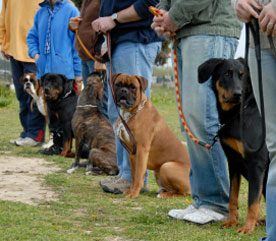
Celebrity trainers have helped dog training grow into a massive industry. Their 30-minute segments sometimes make the process seem like magic. But is celebrity status really what matters when it comes to choosing an instructor? No. What does is your gut reaction to their methods.
It’s why you’ll need to visit a few training schools and judge them for yourself. Get recommendations from your veterinarian, pet supply store staff, groomers, neighbours, and family members. Call a few of these schools and ask if you can watch a class in action.
Look for a positive environment
- Watch for continual encouragement and praise from the head instructor and their assistants as each dog/human team navigates through the exercises.
- Expect some joyful chaos, but be sure instructors can keep their classes organized and on track.
- Instructors should demonstrate knowledge of dog behaviour, and understand that not all humans or dogs learn the same way, or at the same speed.
- The instructors should be teaching the humans, who in turn teach their dogs. If any dog/human team is having difficulties with the exercises, a staff member should be taking them aside for individual help.
- Do you see happy faces – both human and canine? That’s usually a tell-tale sign!
Positive training techniques are based on the mantra “reward desirable behaviour; ignore undesirable behaviour.” When a dog does something right, a positive trainer rewards with treats, attention, praise, or play. When the dog does something wrong, the mistake is ignored and any reward witheld. This way, the dog learns that good things happen when he does something right.

Avoid a trainer who uses negative methods
Negative methods include frightening dogs by yelling, intimidating, tugging aggressively on their collar or leash, or physically manipulating them in a rough manner. If you’re witness to anything that looks wrong, trust your gut and head for the door.
Questions to ask the trainer
- How do they keep updated on dog behaviour and training techniques?
- Are they a member of any professional dog training associations?
- Once beginner classes are completed, are advanced classes available?
- Is the trainer available for private consultation between classes if necessary?
- Does the school require proof of vaccinations and/or veterinary health clearance prior to attending classes?
No mandatory license for dog trainers
With no licensing bodies currently available for dog trainers in Canada, anybody can hang out a shingle and offer classes. A forward-thinking teacher should be keeping up with new trends and techniques. Ask if your trainer is a member of the Canadian Association of Professional Pet Dog Trainers (CAPPDT), which offers learning resources and communication among its membership.
A final note
Don’t forget that each dog and human learns at his or her own pace. If you find that you’re not able to teach your dog in a class environment, don’t give up hope! Private at-home instruction is also offered by many dog training schools.